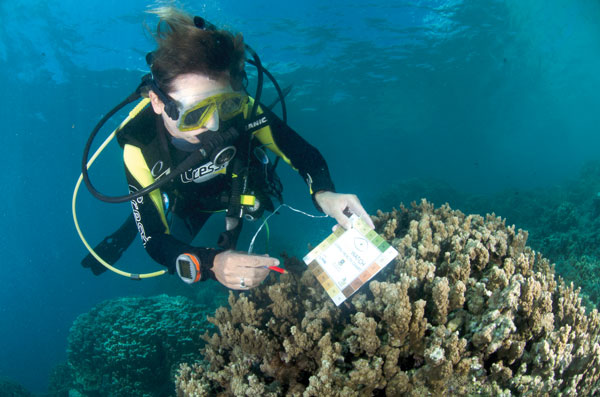Citizen Scientists on Vacation
By Heather Creech

It’s winter across Canada and the US, and many of us are dreaming of warmer waters and planning dive trips abroad. But did you know that at the same time as you are exploring new wonderlands you can also help with their survival?
Many divers on holiday contribute to scientific research while diving for pleasure. They know that marine research programs need data – and lots of it – on what is changing in reef ecosystems. Divers, even those just visiting a reef for a short time, can help by recording observations of local fish populations, coral and marine plant health, and endangered or invasive species. It takes a little extra effort to log what you see and to share your photos with marine scientists, but your data, together with observations from hundreds of other vacationing divers, will advance understanding of reef ecosystems around the world.
Out of the dozens of international marine citizen science projects underway, here are just five that you can contribute to while on holiday.
Coralwatch (www.coralwatch.org) has been monitoring coral health in nearly 80 countries since 2002. On request, they send divers an easy-to-read Coral Health Chart that uses coral colour as an indicator for reef health. Divers compare the colours on the reef with those on the chart and record their findings. Data is uploaded using mobile apps or the CoralWatch website, feeding directly into a global coral bleaching database.
REEF – Reef Environmental Education Foundation (www.reef.org) collects surveys of marine life in almost every region of the world. Warm water locations include the tropical zones of the Atlantic and Pacific coasts, the Mediterranean, Hawaii, South Pacific islands, and the central Indo-Pacific. If your dive trip is taking you to any of these locations, you can request a package of information from REEF, including species ID charts and slate, and instructions on how to log what you see on your dives.
If you find monitoring a range of species in an unfamiliar location a bit daunting, you can focus on a favourite creature, such as:
Sharks: Shark populations are being tracked by at least two programs: Shark-base (www.shark-base.org) and Shark-pulse (baseline.stanford.edu). Submit your photos of all sharks spotted on your vacation together with location, date, time, and related information.
Clownfish: Clownfish are a popular aquarium species and the pressure on populations is significant. Saving Nemo (www.savingnemo.org/ic-anemone) is tracking clownfish abundance and needs your observations to help assess whether they are becoming endangered.
Sea turtles: For over 20 years, SeaTurturtle.org has supported research and conservation efforts across the global sea turtle community. They want you to log all observations of live sea turtles through their website (seaturtle.org).
In preparing to be a citizen scientist while you are on holiday, consider the following:
- Is there a species or issue that you are passionate about and want to help with (such as manta rays or marine debris)?
- Is there a marine citizen science project that works on that issue? You can search online or check directories such as SciStarter (scistarter.com), Zooniverse (zooniverse.org) or iNaturalist (inaturalist.org). Be sure to confirm by email or phone that the project is still active and accepting data.
- How will the project use your data? How can you stay in touch to learn how scientists are interpreting the observations?
- Does the project provide you with support materials (online training, fish guides, etc.)?
- Are you prepared to do some work in advance on your identification skills? Do you have any reference books or know any experts who could brief you before you go?
- Will your dive buddy support your interest and help you with monitoring?
- Finally, assess your skills. Have you mastered your buoyancy; do you keep your gauges, photography gear and slates well secured; are you able to multi-task, keeping an eye on your air, depth, and time and communicating with your buddy while you are also taking photos and recording what you are seeing?
Wherever your diving takes you this winter, all of you, even the newest of open water divers, can support marine research by becoming citizen scientists. The reefs need you as much as you need a vacation!
Heather Creech is a citizen scientist with ReefWatch South Australia and a freelance writer, dividing her time between Victoria,
BC, and Adelaide, South Australia.
Leave a Comment







